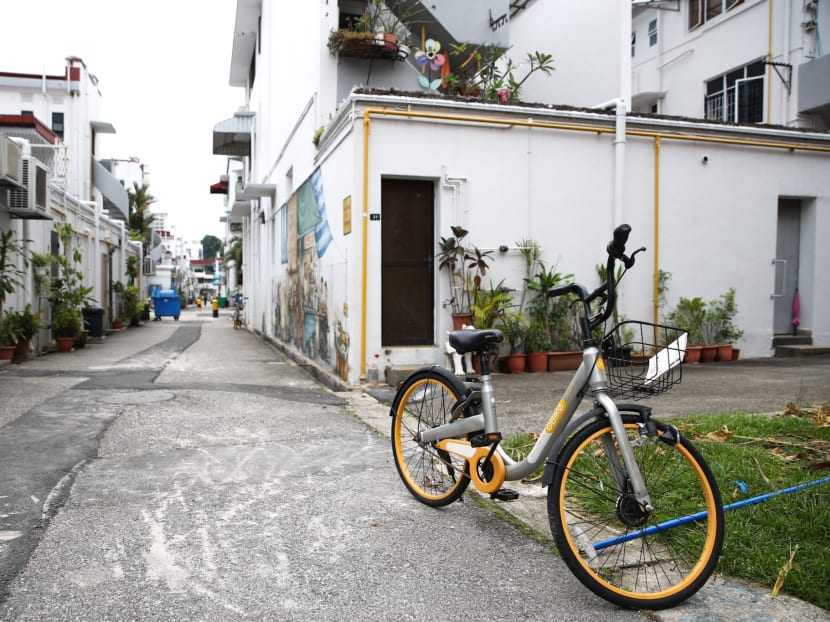New licensing regime for bike-sharing operators to kick in from October: MOT
SINGAPORE — The new licensing regime for bicycle sharing kicks in from October this year, and operators who still require user deposits may be asked to place guarantees, in the form of a security deposit or performance bond.
SINGAPORE — The new licensing regime for bicycle sharing kicks in from October this year, and operators who still require user deposits may be asked to place guarantees, in the form of a security deposit or performance bond.
Noting that none of the existing operators require deposits in the aftermath of the oBike debacle, Senior Minister of State for Transport Janil Puthucheary said in Parliament on Monday (July 9) that new operators are "likely to offer their services without deposits, so as to better compete with existing operators".
Even so, the Land Transport Authority (LTA) will study the need for bike-sharing operators to place a security deposit or performance bond, if there are operators which require user deposits when the new licensing regime is implemented.
Responding to questions in the House, Dr Puthucheary: "oBike's sudden exit has inconvenienced many Singaporeans. It has raised some concerns and questions."
Two weeks ago, citing an inability to meet the strict requirements under a new licensing framework passed earlier in March, oBike had abruptly announced that it was pulling out from the Singapore market, where it claims to have more than a million users.
The issue of deposit refunds was the biggest subject of users' ire, as scores of commuters were left scrambling to recover the mandatory deposits of up to S$49 that they placed with oBike. On the heels of that, Mobike, the last remaining operator requiring a user deposit, announced last month that it was waiving deposits for Singapore users.
Calling oBike's reason for its exit a "convenient excuse", Dr Puthucheary said that the Government is tightening regulations so that only "operators with responsible and sustainable bicycle management plans can operate in Singapore".
With dockless bicycle-sharing services offering Singaporeans a convenient travel option, he said the Government had "adopted a light touch regulatory approach at the start, so as not to kill off this new innovative business model prematurely".
However, with "actual experience of both the benefits, and the significant social disamenities caused by indiscriminate bicycle parking", he said the decision was made to tighten regulations.
Under the amended Parking Places Act, bike-sharing companies are required to apply for a licence to operate here.
The regime requires operators to fork out S$60 for every bicycle deployed -- comprising a licensing fee and a security deposit -- on top of a S$1,500 application fee. As part of the licensing conditions, operators will have to properly regulate indiscriminate bicycle parking.
He added that the authorities were mindful to "minimise compliance costs" for operators, as they could in turn be passed on to users. "LTA finalised its regulations only after extensive consultation with the bicycle-sharing operators, including oBike," he said.
At the close of the application deadline last Saturday (July 7), seven bicycle-sharing firms had submitted their applications to the LTA for a licence to operate dockless bicycle rental services.
Mobike, ofo, SG Bike and GBikes — applied for a full licence, while three others — Anywheel, QiQi Zhixiang and GrabCycle — applied for a regulatory sandbox licence. The latter is for firms without a sufficiently long track record in operating a bike-sharing service in Singapore.
Other than oBike, two other operators — GBikes and ShareBikeSG — had earlier announced that they would bow out of the Singapore market.
Dr Puthucheary said that the LTA will evaluate each application based on the strength of the proposal, especially each operator's plans to minimise indiscriminate parking.
As for oBike, Dr Puthucheary also stressed the urgency for the company to remove its bicycles from public spaces. The LTA had extended its deadline for oBike to remove its two-wheelers after the initial deadline expired on July 4. The company now has until the end of the month to remove some 14,000 bicycles.
"It is oBike's responsibility to have a concrete plan to refund user deposits and remove its bicycles from public spaces. If LTA has to step in to remove its bicycles, we will impose fees on oBike for doing so. LTA and Consumers Association of Singapore (Case) will continue to engage oBike on its responsibilities," he said.
As bike-sharing will not only allow Singaporeans to close the last mile gap in personal transport, but also offer a possible leisure activity for good health, he said the Government does not wish to remove this particular service.
Responding to supplementary questions, Dr Puthucheary emphasised that the introduction of the licensing regime was a recalibration of the "light (regulatory) touch" that authorities have adopted towards disruptors in the bike-sharing market, for instance.
He said that since this business model "appeared just over a year ago", such businesses should be given some "runway" to evolve and settle their finances.
However, "where there are issues which are critical, (such as) dealing with personal safety, yes, we should be far more aggressive. (But) where its about social disamenities and behavioural change, perhaps (the Government) also need to learn the lessons, so that as regulators and potential future operators, we can find a way to best serve future consumers," he added.










